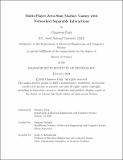Multi-Player Zero-Sum Markov Games with Networked Separable Interactions
Author(s)
Park, Chanwoo
DownloadThesis PDF (913.8Kb)
Advisor
Ozdaglar, Asuman
Terms of use
Metadata
Show full item recordAbstract
We study a new class of Markov games, (multi-player) zero-sum Markov Games with Networked separable interactions (zero-sum NMGs), to model the local interaction structure in non-cooperative multi-agent sequential decision-making. We define a zero-sum NMG as a model where the payoffs of the auxiliary games associated with each state are zero-sum and have some separable (i.e., polymatrix) structure across the neighbors over some interaction network. We first identify the necessary and sufficient conditions under which an MG can be presented as a zero-sum NMG, and show that the set of Markov coarse correlated equilibrium (CCE) collapses to the set of Markov Nash equilibrium (NE) in these games, in that the product of per-state marginalization of the former for all players yields the latter. Furthermore, we show that finding approximate Markov stationary CCE in infinite-horizon discounted zero-sum NMGs is PPAD-hard, unless the underlying network has a “star topology”. Then, we propose fictitious-play-type dynamics, the classical learning dynamics in normal-form games, for zero-sum NMGs, and establish convergence guarantees to Markov stationary NE under a star-shaped network structure. Finally, in light of the hardness result, we focus on computing a Markov non-stationary NE and provide finite-iteration guarantees for a series of value-iteration-based algorithms. We also provide numerical experiments to corroborate our theoretical results.
Date issued
2024-02Department
Massachusetts Institute of Technology. Department of Electrical Engineering and Computer SciencePublisher
Massachusetts Institute of Technology